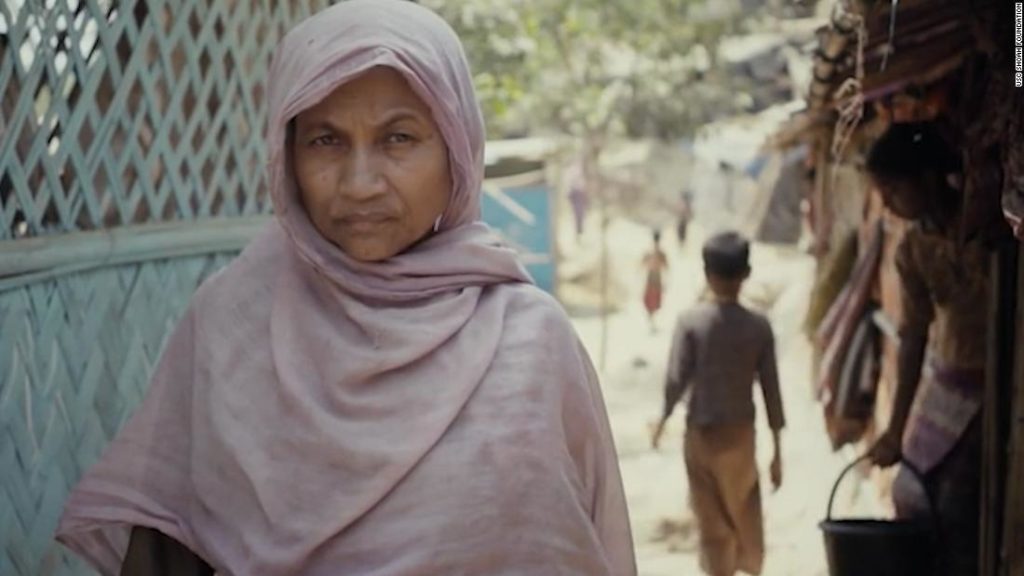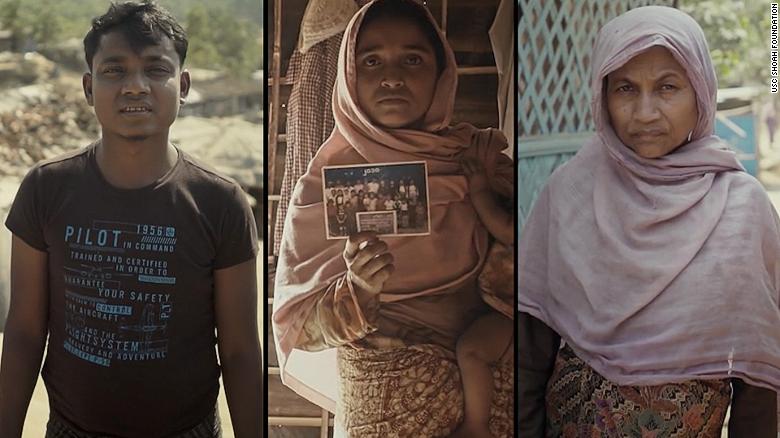‘Everybody’s Talking about Them, But Who’s Talking with Them?’ – Documenting Rohingyas’ Stories
ASIA-UPDATES ON MYANMAR ROHINGYA GENOCIDE, 27 Aug 2018
26 Aug 2018 – They stand among the ramshackle surroundings of their new lives, staring intently into the camera. For a handful of the estimated 700,000 Rohingya refugees who have fled across the border from Myanmar to overcrowded, under-resourced refugee camps in neighboring Bangladesh, this is a rare chance to tell their stories.
Dispassionately and with a matter-of-fact delivery at odds with their testimony, they recount what they say are the horrors that have led to their present situation.
One man, Mawaha Nurul Kamal, holds up a list of people from his village he says were killed by the Myanmar military, and how they died. It is a thick sheaf of pages. As the village imam, he says it was his responsibility to keep the record.
Another, Ammad Hossan, says that he witnessed the murder of one- and two-month-old infants.
Read more: Rohingya girls face ‘prison-like’ conditions in refugee camps
Myanmar’s military has repeatedly denied that it has deliberately attacked unarmed Rohingya — despite a senior UN official saying the crisis has the “hallmarks” of genocide. Instead, the authorities insist that it only targets Rohingya militants, mostly from the Arakan Rohingya Salvation Army (ARSA) insurgent group, that have launched deadly attacks on police posts.
“There is no evidence that Myanmar soldiers committed any human rights violations in their response to the ARSA terrorist attacks of 2017,” Myanmar government spokesman Zaw Htay told CNN earlier in August.
“We have recently formed a new independent commission, which will investigate alleged rights abuses in Rakhine State including rape. We will treat any case in accordance with the rule of law.”

Morizan claims that the Myanmar military would harass her community with constant demands for money. If any of her children wanted to get married, the soldiers would demand large fines, she says.
‘Who’s talking with them?’
For Karen Jungblut, Director of Global Initiatives at the Shoah Foundation, who has conducted several of the Rohingya interviews, it is important that Rohingya are given an opportunity to tell their own stories in their own words.
“Everybody’s talking about them, but who’s talking with them? How do we make sure that they are part of the conversation?” she says.
Around 100 interviews have so far been conducted, part of a sprawling initiative by the USC Shoah Foundation.
The project has previously recorded oral accounts from Holocaust survivors, as well as testimonies from the 1994 Rwandan Tutsi Genocide, the 1937 Nanjing Massacre, the Armenian Genocide and the Guatemalan Genocide, and now its eye has turned to eastern Bangladesh on the one-year anniversary of this — the latest, and one of the largest — flights of humanity from persecution.
Ashley Judd visits Rohingya refugees:
httpv://www.youtube.com/watch?v=s2mcVLJSBI8
Among the tales of murder and rape are vignettes of the humiliations that many Rohingya say they have had to endure.
One man holds up registration photos he says were taken by the military — they rounded us up and put signs around our neck like cattle, he says. The families themselves were forced to pay a fee for the photograph, and fined if there were any new additions, or anyone missing. A fine of 15,000 kyat (around $10) was levied if there was a death in the family, he says.
Jamela Khatoun, a mother of 10, alleges that her children were denied an education because of their ethnicity and religion. Still, though, she says she yearns to return to the place that the Rohingya insist is their rightful homeland.
“We would be happy to if we were able to live in Myanmar as citizens.”
To continue reading the report, Go to Original – cnn.com
DISCLAIMER: The statements, views and opinions expressed in pieces republished here are solely those of the authors and do not necessarily represent those of TMS. In accordance with title 17 U.S.C. section 107, this material is distributed without profit to those who have expressed a prior interest in receiving the included information for research and educational purposes. TMS has no affiliation whatsoever with the originator of this article nor is TMS endorsed or sponsored by the originator. “GO TO ORIGINAL” links are provided as a convenience to our readers and allow for verification of authenticity. However, as originating pages are often updated by their originating host sites, the versions posted may not match the versions our readers view when clicking the “GO TO ORIGINAL” links. This site contains copyrighted material the use of which has not always been specifically authorized by the copyright owner. We are making such material available in our efforts to advance understanding of environmental, political, human rights, economic, democracy, scientific, and social justice issues, etc. We believe this constitutes a ‘fair use’ of any such copyrighted material as provided for in section 107 of the US Copyright Law. In accordance with Title 17 U.S.C. Section 107, the material on this site is distributed without profit to those who have expressed a prior interest in receiving the included information for research and educational purposes. For more information go to: http://www.law.cornell.edu/uscode/17/107.shtml. If you wish to use copyrighted material from this site for purposes of your own that go beyond ‘fair use’, you must obtain permission from the copyright owner.
Read more
Click here to go to the current weekly digest or pick another article:
ASIA-UPDATES ON MYANMAR ROHINGYA GENOCIDE:
